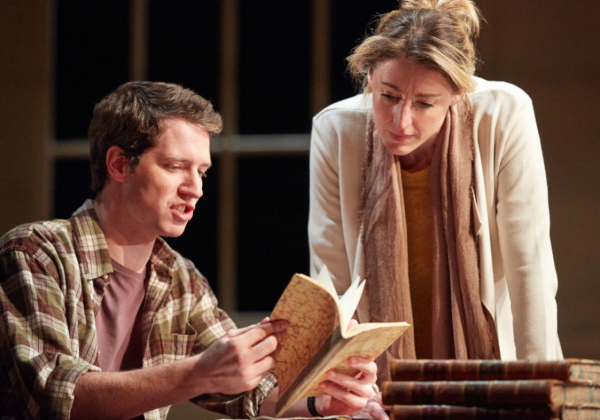Michael Coveney: Brighton, Bull and yet more critical crises
‘I never thought I’d live to see or hear so many theatre professionals pleading for the reinstatement of critics’

© Mark Douet
Pirandello's Six Characters in Search of an Author, so beautifully revived at the Barbican this week by the Théâtre de la Ville in Paris, is all about adjusting your perspectives, seeing things in a new light. Actually, that's what all good theatre is about, when you boil it down, and not just the examination of the body on the slab but the type and provenance of the slab itself, too.
Seeing the new Tom Stoppard play, The Hard Problem, at the National Theatre last week is an entirely different type of experience to seeing Blanche McIntyre's touring revival of Arcadia at the Theatre Royal in Brighton on Tuesday night. The NT audience is compiled of people with a special interest in the playwright, whereas in Brighton you feel that the audience is not quite sure what to expect and surprised and not a little delighted when they find it. They used to be a harsh and conservative crowd in the Theatre Royal; Joe Orton and Beyond the Fringe were notorious recipients of the noisy upturned seat and loud exit syndrome, but times really have changed, and so have audiences.
I always love going to Brighton, a town, Keith Waterhouse once said, with a permanent air of being in a position to assist the police with their enquiries. And I think that raffish, holiday atmosphere about the place seeps into the theatre, too, and defines the conditions of a performance. Arcadia is in many ways a sedate and serious play, but the jokes and the coincidences, the clash of period and historical detail, seemed somehow absolutely appropriate for the mood in the red plush stalls and beautiful circles.
All theatre is site-specific in that all theatre is defined by its audience as well as the venue it's presented in. And catching up with Mike Bartlett's Bull at the Young Vic this week was a real eye-opener. The cheerless breezeblocks of the small Maria studio have been transformed in Soutra Gilmour's boxing ring design, with some of the audience standing at rails around the acting arena and lights up full on the office politics of abuse and exclusion. There's a distinct air of Pinter's The Birthday Party, with Adam James and Eleanor Matsuura the Goldberg and McCann to Sam Troughton's doubting Thomas, who is also deprived of his specs, like Pinter's Stanley, in the climactic brouhaha.
Above all it's the concentration and involvement of the young "up for it" audience that really impresses, many of them probably coming across the road from seeing Daniel Kitson in Tree at the Old Vic for just £16 (I've managed to buy virtually the last ticket available for the return engagement later this month); this combination of low price tickets, informality, a buzzing "destination" venue – this has to be the future of theatre, and the kind of work that audiences wants to see will follow as surely as night follows day.
And it's that work we as critics want to discuss, rather than our own jobs, which is becoming almost a mantra in the media. For at least the second time, in The Stage this week, Daniel Evans of Sheffield Theatres has entered the lists on behalf of critics who are losing their jobs and their status within the print media at an alarming rate. I never thought I'd live to see or hear so many theatre professionals pleading for the reinstatement of critics on newspapers which have done away with them – notably Metro and The Independent on Sunday. The blanket blogosphere is not the answer to this crisis, says Evans. Nobody really understands why newspapers should be so keen to dispense with arts coverage while increasing, to an almost staggering degree, their coverage of sport and food and restaurants.
And now the Critics' Circle, without so much as a by-your-leave from its own membership, has announced they will publish reviews online in the near future. This initiative comes from the new president, dance critic Jeffery Taylor, on whom the irony of dance criticism decreasing exponentially to the explosion of the dance audience cannot be lost. But I'm not at all sure that the Critics' Circle should become a publishing concern; its function is to represent and defend the interests of its membership wherever possible, and membership is (or at least used to be) only available to those critics who have demonstrably made their living from criticism for at least two years. It just doesn't sound right to me, at least, that my membership fees should go towards publishing other peoples' reviews merely because they are not being published elsewhere, and I am astonished that the council has sanctioned this new step – if indeed they have – without consulting the membership.












